In our fast-paced world that’s becoming ever more focused on individual achievement, an increasing number of people yearn for a deeper connection to their inner selves and the universe.
These individuals, who come from all walks of life, are stopping to ask, “Why?” Rather than endlessly being consumed with the “How” of a life filled with the continual pursuit of goals.
Such people are challenging the notion that accumulating more money, fame, connections, status, and milestones is always the path to happiness and well-being.
Many equate this more connected, balanced, and holistic view of oneself and the world with spirituality. And interest in this topic extends far beyond a niche group of alternative thinkers.
In fact, decades of scientific research have demonstrated that higher levels of spirituality are associated with higher levels of psychological well-being, a greater sense of purpose in life, positive relationships with others, more pro-health behaviors, and a stronger sense of purpose and meaning [1].
As a result, many coaches and therapists now incorporate elements of spirituality into their practice. Some who specialize in this area have adopted the title of spiritual coach.
A unique blend of a life coach, counselor, and spiritual guide, a spiritual coach plays a critical role in aiding individuals on their life-long journey. In this comprehensive guide, we’ll delve into the ins and outs of spiritual coaching, providing invaluable insights into the profession, its relevance, and its impact.
We’ll also explain how Quenza, a software platform designed specifically for coaches and therapists, can help coaches of all backgrounds utilize spirituality in their client work.
To try Quenza out for yourself, sign up now for a free full-access 1-month trial.
A Fluid and Dynamic Coaching Speciality
One of the first questions people new to exploring their spirituality ask is, “What is a spiritual coach?”
To answer this question properly, it’s necessary first to step back and define spirituality. And if you think this sounds tricky, guess what—you’re right!
As we’ll cover below, there is no universally agreed-upon definition of spirituality. However, some common threads weave through most definitions of this important topic.
Spirituality Defined
To get you oriented, let’s look at a few definitions of spirituality from the academic literature on this topic.
Spirituality is an “unstructured, personalized, and naturally occurring phenomenon where a person seeks closeness and/or connectedness between him/herself and a higher power or purpose.”[2]
Spirituality can be understood as “a multidimensional theoretical construct. It constitutes transcendence, understood as going beyond or above ‘the real I.’ In this context, spirituality is defined as experiencing transcendence through inner peace, harmony, and connectedness to others.”[3]
Rather than defining the term, other scholars have categorized the content topics across more than 70 definitions of spirituality.
These topics (none of which are all contained in any one definition of spirituality) include[4]:
- Connectedness or relationship
- Processes contributing to a higher level of connectedness
- Reactions to sacred or secular things
- Beliefs or thoughts
- Traditional institutional structures
- Pleasurable existence
- Beliefs in the sacred or higher being
- Personal transcendence
- Existential issues or concerns
Therefore, when someone asks, “What is a spiritual coach?” You could include a practitioner focusing on the above 9 domains.
Spirituality and Religion
Another common query (and concern) some people have is, “What is the difference between spirituality and religion?”
Again, there is no clear-cut answer to this.
Some people separate the two topics, as seen in the definition below:
“Spirituality differs from religion as the latter is rather linked with specific rituals, institutional dependencies, and social relationships, whereas the former is more about personal experiences of what is unseen and recognized as greater than ourselves.”[3]
While others make the argument that both can (and often do) coexist, defining spirituality as:
“Any support, behaviors, or beliefs linked to religious or spiritual beliefs or institutions, including but not limited to tangible support from religious organizations, personal prayers between an individual and a higher power, and specific group faith community rituals.”[5]
What Is Spiritual Coaching?
To come back to our original question, on a broad level, a spiritual coach is a trained professional who assists individuals in their spiritual development.
As described above, each individual’s definition and experience of spirituality will be different. So, spiritual coaches need to be comfortable operating in a fluid and dynamic manner and being responsive to their clients’ needs.
Spiritual coaches work within their clients’ spiritual beliefs and values, focusing less on materialistic ambitions and more on broader existential questions. They don’t have to be associated with any particular religious practice, and they respect and work within each individual’s unique spiritual beliefs.
Tools and Techniques Used In Spiritual Coaching
Functioning at the crossroads of life coaching and spiritual guidance, spiritual coaches employ various coaching techniques to enable clients to discover and traverse their spiritual paths.
Their primary responsibility involves facilitating clients’ spiritual awakening, evolution, and enlightenment. They aid clients in identifying and articulating their spiritual goals, overcoming spiritual obstacles, and developing practices that promote spiritual growth.
The tools, worksheets, and exercises used by a spiritual coach might involve methods like:
- Guided visualization
- Meditation and mindfulness
- Breathwork
- Journaling
- Energy healing, such as Reiki or crystal healing
- Intuitive readings
- Yoga, Tai-Chi, and Qigong
The ultimate aim of a spiritual coach is to empower clients, enabling them to find inner peace, spiritual growth, and a deeper understanding of their life and purpose. As you might expect, the tools and techniques to support these processes are incredibly varied. So don’t be surprised if you encounter spiritual coaches using tools not on the above list.
To give you an idea of how Quenza might fit in with spiritual coaching, here are a few snippets from our exercise on Gratitude Meditation.
We start by inviting participants to consider the source of a recent positive event they may have experienced.
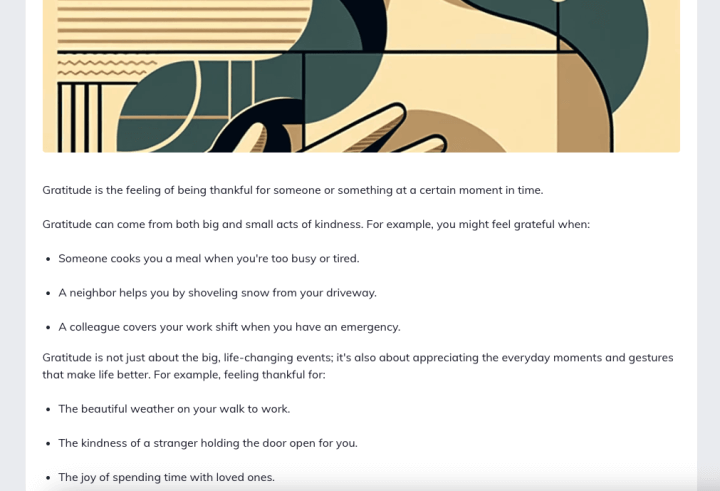
Then, follow this up with a guided meditation.
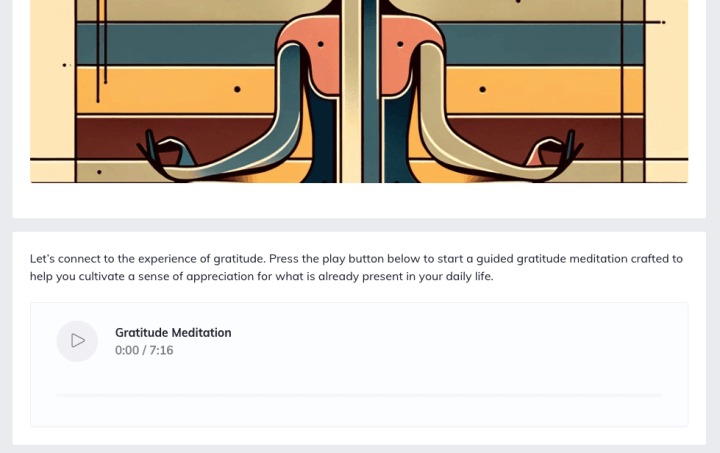
Followed by reflections, which can be done with or without the coach. You can even customize the activity by adding more spiritually focused prompts if desired.
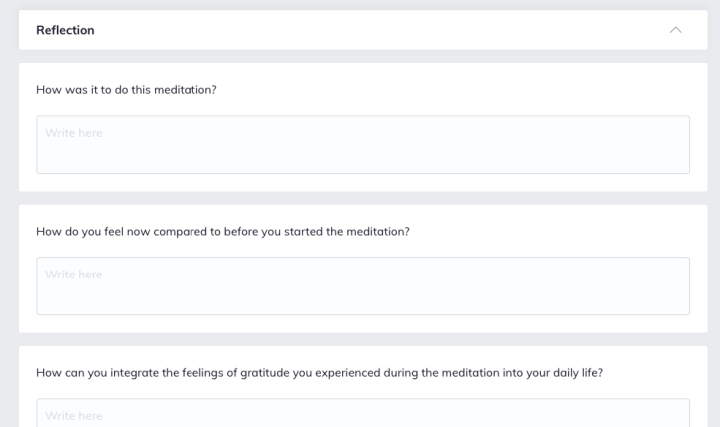
An Unlikely Partnership
At first pass, technology might not seem all that relevant to spiritual coaching. However, with the advent of online coaching and digital healthcare, spiritual coaches increasingly utilize software to deliver their services.
One such platform is Quenza, a purpose-built practice management solution for coaches and therapists.
The intuitive suite of features in Quenza allows you to:
- Create your own exercises with the drag-and-drop activity builder, then assign them to clients anywhere in the world
- Utilize our extensive Expansions Library, with 250+ ready-to-use customizable forms, tools, and exercises
- Save, share, and comment on client notes
- Run group coaching programs hosted securely on the platform with Quenza Groups.
- Send a fully automated series of activities to clients called pathways
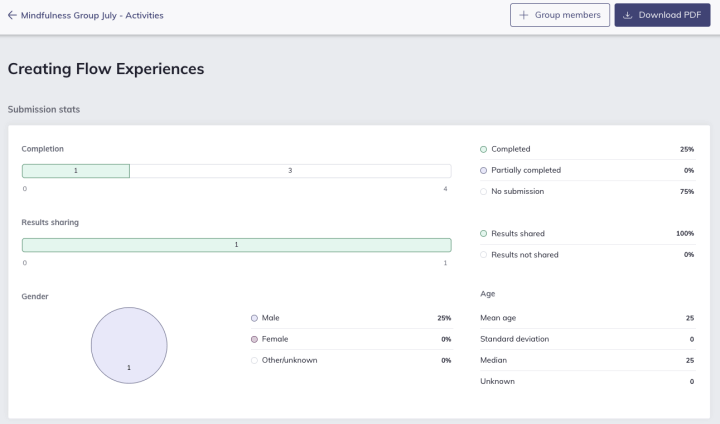
To try Quenza out today, sign up now for a free full-access 1-month trial.
Life Coach vs Spiritual Coach
In understanding the realm of coaching, it’s crucial to distinguish between life coaches and spiritual coaches, as they serve distinct, albeit sometimes overlapping, purposes.
A life coach primarily helps clients set and achieve personal and professional goals, such as skill development, improving mindset, or enhancing personal relationships.
A spiritual coach goes beyond the material aspects of life, focusing more on the client’s inner world and connection to something beyond concepts and language—the outer experience. They help individuals find meaning and purpose, connect with their inner self, and develop a deeper belonging to the fabric of the universe, including time and space.
To give an example, a life coach might guide someone in changing jobs through career coaching. A spiritual coach would help that same person explore what they’re truly passionate about and how it aligns with their spiritual beliefs and values.
Becoming a Spiritual Coach
If you’re wondering how to become a spiritual coach, the first thing to be aware of is that the path isn’t usually straightforward.
Becoming a spiritual coach requires a combination of personal exploration, formal education, and practical experience. It often begins with a journey of self-discovery, where aspiring coaches explore their own spirituality, understand different spiritual philosophies, and cultivate a deep desire to help others on their spiritual paths.
While there isn’t a universally recognized degree requirement to become a spiritual coach, various educational programs can equip prospective coaches with the skills necessary for the profession. These may include programs in spirituality, psychology, counseling, or coaching. Courses in meditation, mindfulness, energy healing, and other holistic practices can also provide a solid foundation for a career in spiritual coaching.
What About Certification?
Spiritual coach certification isn’t required to offer spiritual coaching, but it can be highly beneficial.
Coaching certification assures clients of your credibility by demonstrating that the coach has achieved a certain standard of competence. Certifications are often provided by recognized coaching associations, such as the International Coaching Federation, or specialized spiritual coach training programs.
These certification programs typically involve coursework, practical coaching experience, and sometimes a final exam or project.
Certification covers various topics, such as:
- Coaching ethics
- Spiritual counseling techniques
- Personal development
- Business aspects of coaching
Because spiritual coaches’ areas of focus and techniques vary so much, some practitioners choose to obtain a general coaching certification and then specialized spiritual healing training. For example, a spiritual coach who utilizes energy healing might obtain certification as a life coach alongside training in Reiki and quantum healing (or vice versa).
Growth, Purpose, and Well-Being
Spiritual coaching topics cover a broad range, each aiming to facilitate a client’s spiritual growth and understanding. These topics often include:
- Exploring and defining personal spiritual beliefs
- Developing intuitive abilities
- Understanding and navigating spiritual awakenings
- Energy management
- Overcoming spiritual challenges
Spiritual coaches usually help clients explore questions of purpose and meaning in life and how their spiritual beliefs align with their life choices. They also instill compassion, appreciation and wonder of the world clients operate in.
Coaches may use various tools and techniques to address these topics. The goal isn’t just to provide answers but to equip individuals with the know-how to navigate their spiritual journey confidently and autonomously.
Meaning and transcendence are key spiritual coaching topics. If you’re looking for a ready-made activity to use with your clients on this subject, the Reflecting on The Person You Want To Be activity in the Quenza app is a good starting point.
This exercise is designed to help clients explore and clarify their core values across various life domains and assess how well they align their lives with these values.
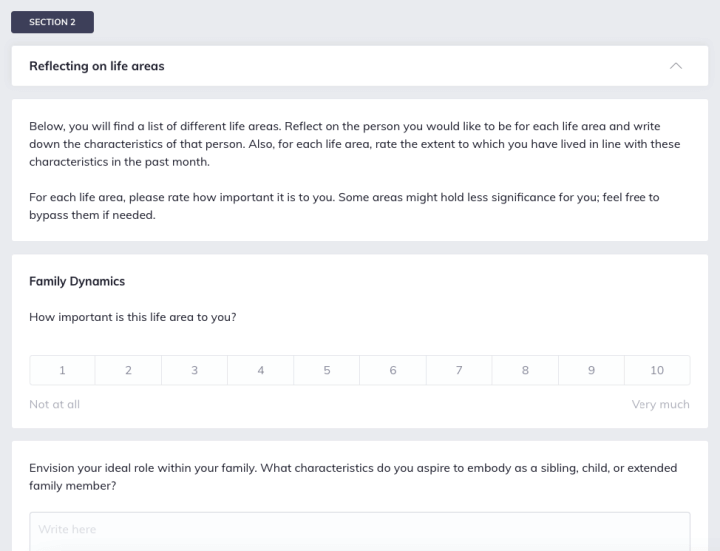
Remember, you can get access to hundreds more exercises like this by signing up to Quenza today, for a full-access 1-month free trial.
Earning Potential for a Spiritual Coach
How much spiritual coaches make can vary significantly based on factors like experience, certification, location, and area of specialization.
As a general guide, clients can expect to pay between $50 and $200 per hour for a spiritual coach. However, spiritual coaching is particularly well suited to digital products and services.
Some coaches offer packages or programs ranging from a few hundred to several thousand dollars. Many of these are fully digital online courses consisting of pre-recorded materials and downloadable resources.
Overall, the financial success of a spiritual coach depends largely on the coach’s business skills, marketing efforts, and the quality of service they provide. As coaches build their client base and gain more experience, their earning potential can increase.
Marketing and Spirituality
Marketing is an area many spiritual coaches struggle with. Some practitioners express concern that the self-promotional aspect of marketing goes against their spiritual philosophy.
When marketing is done poorly, this concern may be valid. But the reality is, it’s entirely possible (and not overly difficult) to learn how to market yourself as a spiritual coach in an authentic, generous, customer-focused way. The key is in how you perceive marketing.
Marketing Guru (and spirituality buff), Seth Godin, provides several examples of how marketing can be conceptualized ethically in his classic best-seller, This Is Marketing, such as:
“Marketing is the generous act of helping others become who they seek to become. It involves creating honest stories—stories that resonate and spread.”[6]
“Marketing is the generous act of helping someone solve a problem. Their problem.”
“We sell feelings, status, and connection. Not tasks and stuff.”
Looking through that lens, it’s clear that you can undertake marketing in a way that benefits the greater good and helps you run a thriving business.
This may involve things like creating a professional website, actively creating and engaging on social media, and regularly publishing useful and relevant content such as blog posts, podcasts, or videos.
When any of the above are approached from the perspective of sharing your gifts to help potential customers, your marketing will be ethical and authentic.
Remember, your skills as a spiritual coach can transform people’s lives. So don’t keep them to yourself. Consider hiring a marketing coach if you need to. But whatever you do, make sure the people you’re equipped to help are able to find you.
Exploring Advanced Spiritual Coaching Techniques
Advanced spiritual coaching techniques can profoundly enhance the effectiveness of your practice. One such technique is integrating energy healing practices, such as Reiki or chakra balancing, into your coaching sessions. These practices help clients release emotional blockages and align their energy, promoting overall well-being and spiritual growth.
Another powerful technique is guided visualization and meditation. These tools can help clients connect with their inner wisdom, gain insights into their life purpose, and cultivate peace and clarity. Regular practice of these techniques can lead to deeper self-awareness and spiritual awakening.
Incorporating journaling exercises into your coaching can also be highly beneficial. Encourage clients to journal about their spiritual journey, insights gained from sessions, and any challenges they face. This practice provides a therapeutic outlet and helps clients track their progress and deepen their understanding of their spiritual path.
Lastly, consider using ritual and ceremony in your coaching practice. Creating personalized rituals for clients to mark significant milestones or transitions can be deeply meaningful. These rituals can help clients honor their spiritual journey, celebrate their growth, and set intentions for the future.
Integrating Spiritual Coaching with Modern Technology
Integrating modern technology into spiritual coaching can enhance the reach and impact of your practice. Utilizing online platforms for virtual coaching sessions allows you to connect with clients from anywhere in the world. Tools like Zoom, Skype, or specialized coaching platforms provide a seamless experience for both coach and client.
Digital tools like meditation apps and online journaling platforms can complement your coaching sessions. Recommending apps such as Headspace or Calm for meditation practice or platforms like Penzu for journaling can provide clients with accessible resources to support their spiritual growth outside of sessions.
Social media can be a powerful tool for building a community and sharing valuable content. Platforms like Instagram, Facebook, and YouTube allow you to share insights, host live sessions, and engage with a broader audience. This presence can help you attract new clients and maintain ongoing engagement with current clients.
Finally, consider creating digital courses or webinars on various aspects of spiritual growth. These offerings can provide additional value to your clients and establish you as an expert in your field. By leveraging technology, you can expand your reach, offer flexible support, and enhance the overall client experience in your spiritual coaching practice.
Final Thoughts
As the quest for spiritual growth becomes increasingly prevalent in our fast-paced and rapidly changing world, the role of the spiritual coach emerges as a beacon of light guiding individuals toward meaning, joy, connection, and fulfillment.
The journey of becoming a spiritual coach is challenging, yet rewarding. With the practitioner required to undergo their own spiritual training and transformation, alongside a solid foundation in coaching fundamentals.
Being a spiritual coach provides opportunities to make a profound difference in people’s lives. But to practice effectively in the present-day coaching environment, professionals must have a flexible suite of tools they can use to connect with clients from all walks of life.
Whether you’re just getting started as a spiritual coach or have been practicing for some time, Quenza can help you increase client engagement and expand your impact.
If you’re looking for practice management software, a library of coaching resources, or a platform upon which to run groups and build online courses, we can help. And you can access everything we have to offer right now, by signing up to Quenza today for a free full-access 1-month trial.
References
- ^ Ryff, C. D. (2021). Spirituality and well-being: Theory, science, and the nature connection. Religions, 12(11), 914. doi:10.3390/rel12110914.
- ^ Joseph, R. P., Keller, C., Adams, M. A., & Ainsworth, B. E. (2017). Incorporating religion and spirituality into the design of community-based physical activity programs for African American women: A qualitative inquiry. BMC Research Notes, 10(1). doi:10.1186/s13104-017-2830-3.
- ^ Bożek, A., Nowak, P. F., & Blukacz, M. (2020). The relationship between spirituality, health-related behavior, and psychological well-being. Frontiers in Psychology, 11. doi:10.3389/fpsyg.2020.01997.
- ^ Shek, D. T. L. (2014). Spirituality, overview. In A. C. Michalos (Ed.), Encyclopedia of quality of life and well-being research. Springer, Dordrecht. doi:10.1007/978-94-007-0753-5_2832.
- ^ Howard, A. H., Lipien, L., Dimasuay, K. G., Agbenyiga, D., & Wyatt, J. (2023). The relationship between spirituality and resilience and well-being: A study of 529 care leavers from 11 nations. Adversity and Resilience Science, 4(2), 177–190. doi:10.1007/s42844-023-00088-y.
- ^ Godin, S. (2019). This is marketing. Penguin Business.

